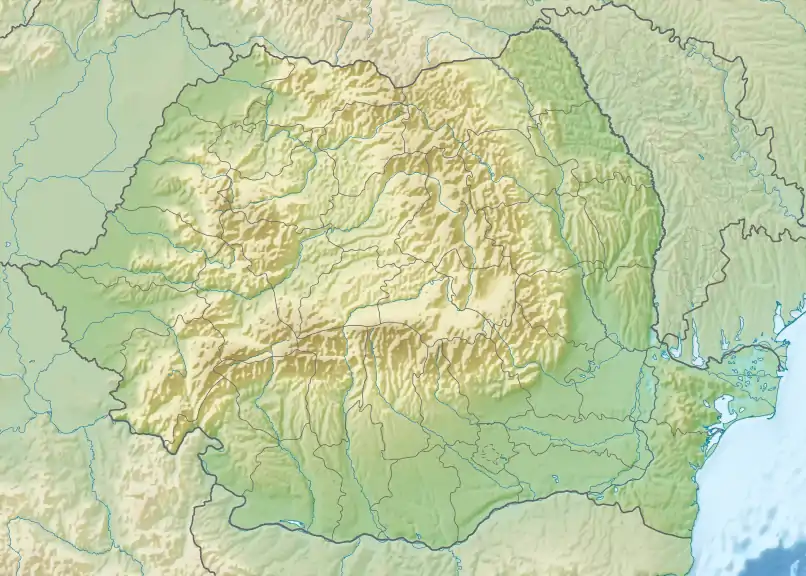| Bauxite of Cornet | |
|---|---|
| Stratigraphic range: Early Cretaceous, | |
| Type | Geological formation |
| Overlies | Overlying and infilling limestone |
| Lithology | |
| Primary | Mudstone, Conglomerate |
| Location | |
| Coordinates | 30°02′06″N 35°15′08″E / 30.035°N 35.2522°E |
| Country | |
| Type section | |
| Named for | A bauxite mine near Cornet, Romania where the formation outcrops |
| Year defined | 1978 |
 Bauxite of Cornet (Romania) | |
The Bauxite of Cornet is a geological formation in Romania whose strata date back to the Early Cretaceous. Dinosaur remains are among the fossils that have been recovered from the formation.[1] It exists as karstic sediments infilling fissures and caves in limestone.
The formation was discovered in a former bauxite mine near Cornet and Oradea during a mine explosion in 1978 but the mine flooded in 1999 so further excavations of the formation are currently impossible.
Vertebrate paleofauna
Pterosaurs
Color key
|
Notes Uncertain or tentative taxa are in small text; |
| Dinosaurs of the Bauxite of Cornet | ||||||
|---|---|---|---|---|---|---|
| Genus | Species | Location | Member | Abundance | Notes | Images |
|
E. corneti[2] |
Judetul Bihor[2] |
Formerly classified as a bird or theropod, actually a pterodactyloid pterosaur.[3] | ||||
|
P. corneti[2] |
Judetul Bihor[2] |
Formerly classified as a bird or theropod, actually an azhdarchid pterosaur.[3] | ||||
Dinosaurs
Color key
|
Notes Uncertain or tentative taxa are in small text; |
| Dinosaurs of the Bauxite of Cornet | ||||||
|---|---|---|---|---|---|---|
| Genus | Species | Location | Member | Abundance | Notes | Images |
|
Indeterminate[2] |
Judetul Bihor[2] |
Possible indeterminate avialan remains.[2] |
| |||
|
Theropoda[2] |
Indeterminate[2] |
Judetul Bihor[2] |
Formerly referred to Aristosuchus.[2] | |||
| Bihariosaurus[4] | B. baxiticus[4] | Judetul Bihor[4] | A possible relative of Camptosaurus. Formerly referred to Valdosaurus.[4] | |||
|
Indeterminate[2] |
Judetul Bihor[2] |
|||||
|
Ornithopoda'[2] |
Indeterminate[2] |
Judetul Bihor[2] |
||||
|
cf. ?Owenodon |
Indeterminate |
Judetul Bihor[2] |
||||
See also
Footnotes
- ↑ Weishampel, David B; et al. (2004). "Dinosaur distribution (Early Cretaceous, Europe)." In: Weishampel, David B.; Dodson, Peter; and Osmólska, Halszka (eds.): The Dinosauria, 2nd, Berkeley: University of California Press. Pp. 562. ISBN 0-520-24209-2.
- 1 2 3 4 5 6 7 8 9 10 11 12 13 14 15 16 17 18 19 20 21 "29.1 Judetul Bihor, Romania; 1. Bauxite of Cornet," in Weishampel, et al. (2004). Page 562.
- 1 2 ^ Federico L. Agnolin and David Varricchio (2012). "Systematic reinterpretation of Piksi barbarulna Varricchio, 2002 from the Two Medicine Formation (Upper Cretaceous) of Western USA (Montana) as a pterosaur rather than a bird". Geodiversitas. 34 (4): 883–894. doi:10.5252/g2012n4a10. Archived from the original on 2013-01-07.
- 1 2 3 4 Posmoşanu, E. (2003). "Iguanodontian dinosaurs from the lower Cretaceous Bauxite site from Romania" (PDF). Acta Paleontologica Romaniae. 4: 431–439.
References
- Weishampel, David B.; Dodson, Peter; and Osmólska, Halszka (eds.): The Dinosauria, 2nd, Berkeley: University of California Press. 861 pp. ISBN 0-520-24209-2.
